Episode 17: Overcoming Social Divisions
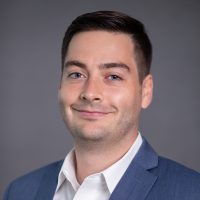
Alex Baker
Atlantic Council
Alex Pieter Baker is a Project Assistant with the Atlantic Council’s Future Europe Initiative. His work centers on transatlantic digital policy, European Union politics, Germany, and transatlantic relations. Prior to joining the Future Europe Initiative, he served as Executive Assistant to the Executive Vice President at the Atlantic Council. He brings a strong understanding of German culture and politics to the program. As an undergraduate student, he lived in Dessau, Saxony Anhalt, during which time he interned in the Mayor’s office. As a graduate student, he spent a year studying at Freie Universität Berlin. Mr. Baker is also a regular contributor to Bloody Hell Magazine, where his articles examine the intersection of politics and soccer in Germany and beyond.
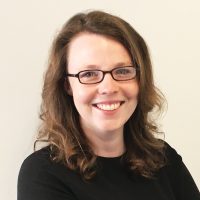
Elizabeth Hotary
Communications Officer
Elizabeth Hotary is the Communications Officer at AICGS. She creates and implements communications strategies, coordinates publishing activities, and manages media relations. She contributes to AICGS research on workforce education and immigration and integration and has co-led AICGS study tours across the United States and Germany. Before joining AICGS, she taught English at a secondary school in Herne, Germany, as part of the Fulbright Program. During her time as a Fulbrighter, she also volunteered with the U.S. Consulate Düsseldorf’s MeetUS program, where she traveled to schools across North Rhine Westphalia to speak with secondary school students about the United States. She has previous experience at the University of Denver's Josef Korbel School’s Office of the Dean and WorldDenver, a nonprofit global affairs organization.
Ms. Hotary received her MA from the Josef Korbel School of International Studies at the University of Denver, where she was a Marc Nathanson Fellow. She graduated magna cum laude from the University of Arkansas with degrees in International Relations, European Studies, and German. She is an alumna of the Aspen Seminar for Young European Leaders "Next-Gen Europe: Leading for Values."
__

Jeff Rathke
President of AGI
Jeffrey Rathke is the President of the American Institute for Contemporary German Studies at the Johns Hopkins University in Washington, DC.
Prior to joining AICGS, Jeff was a senior fellow and deputy director of the Europe Program at CSIS, where his work focused on transatlantic relations and U.S. security and defense policy. Jeff joined CSIS in 2015 from the State Department, after a 24-year career as a Foreign Service Officer, dedicated primarily to U.S. relations with Europe. He was director of the State Department Press Office from 2014 to 2015, briefing the State Department press corps and managing the Department's engagement with U.S. print and electronic media. Jeff led the political section of the U.S. Embassy in Kuala Lumpur from 2011 to 2014. Prior to that, he was deputy chief of staff to the NATO Secretary General in Brussels. He also served in Berlin as minister-counselor for political affairs (2006–2009), his second tour of duty in Germany. His Washington assignments have included deputy director of the Office of European Security and Political Affairs and duty officer in the White House Situation Room and State Department Operations Center.
Mr. Rathke was a Weinberg Fellow at Princeton University (2003–2004), winning the Master’s in Public Policy Prize. He also served at U.S. Embassies in Dublin, Moscow, and Riga, which he helped open after the collapse of the Soviet Union. Mr. Rathke has been awarded national honors by Estonia, Latvia, and Lithuania, as well as several State Department awards. He holds an M.P.P. degree from Princeton University and B.A. and B.S. degrees from Cornell University. He speaks German, Russian, and Latvian.
__
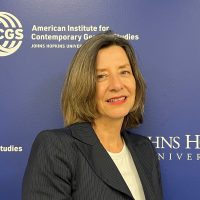
Susanne Dieper
Director of Programs and Grants
Susanne Dieper is the Director of Programs and Grants at AICGS. She oversees the Institute’s programs and projects within the three AICGS program areas, manages all AICGS fellowships, and is in charge of grant writing. Her current focus is on issues related to transatlantic relations, immigration and integration, diversity, the next generation of leaders, workforce education, and reconciliation. She develops programs that align with the mission of AICGS to better understand the challenges and choices facing Germany and the United States in a broader global arena.
Previously, Ms. Dieper was in charge of organizational and project management at AICGS as well as human resource development and board of trustees relations. Prior to joining AICGS, she worked in transatlantic exchange programs, language acquisition, as well as the insurance industry in Germany.
Ms. Dieper holds an MBA from Johns Hopkins University with a concentration in International Business and an MA in English Linguistics and Literature, History, and Spanish from the University of Cologne. She has completed course work in nonprofit management at Johns Hopkins University.
__
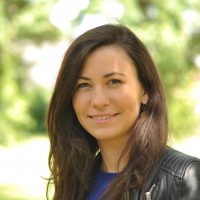
Teresa Eder
Program Director, Heinrich Böll Foundation Washington, DC
Teresa Eder joined the Heinrich Böll Foundation in 2022 and heads the program for Foreign & Security Policy in Washington, DC. The program focuses on strengthening transatlantic exchanges on issues of global peace & security, democracy, and human rights.
Previously, Teresa was a program associate at the Wilson Center’s Global Europe Program and worked as a journalist and TV-news producer for German TV ARD and ZDF in Washington, D.C., and as Deputy Head of the Foreign Desk for the Austrian newspaper “Der Standard” in Vienna. Her producing, writing, and research focused on transatlantic relations, political division, and issues of extremism & disinformation in the United States and Europe.
She holds a Master’s degree in International Relations from Georgetown University’s School of Foreign Service, a Master’s degree in Political Science from the University of Vienna, and a journalism degree from the University of Applied Sciences in Vienna.
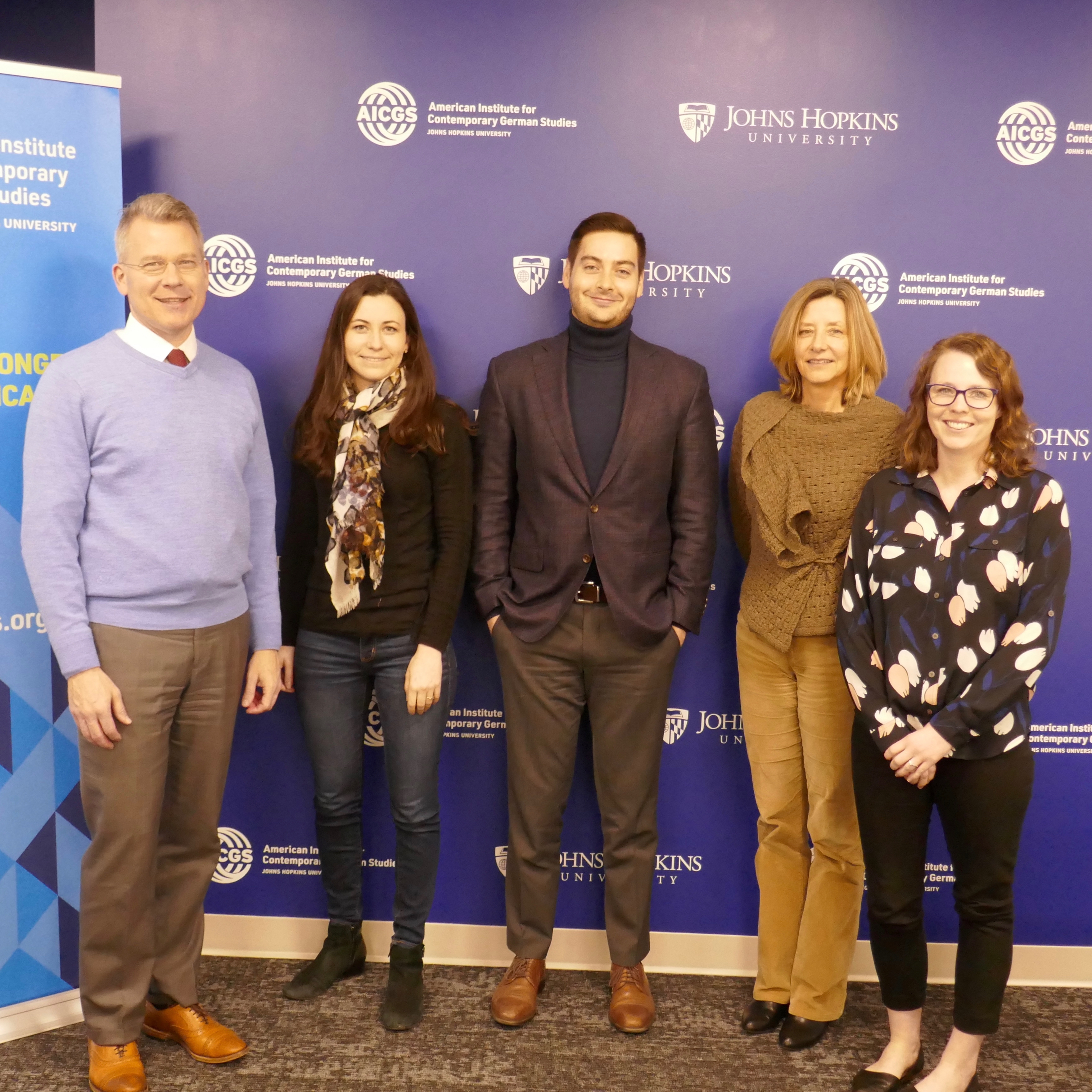 In recent years, the United States and Germany have both experienced growing social divisions, more extreme ideology, and a trend toward existing in our own echo chambers—that is, seeking out voices and opinions that align with our own. In this climate, AGI launched a project focused on the social divisions in our two countries, focusing on a number of factors that are underlying the divisions, including social, demographic, economic, geographic, and identity dynamics. Sixteen participants are part of this project and they have been active, professionally or on a voluntary basis, in the service of communities that have experienced societal division and/or marginalization in the U.S. and Germany. Two participants, Alex Baker and Teresa Eder, join this episode of The Zeitgeist.
In recent years, the United States and Germany have both experienced growing social divisions, more extreme ideology, and a trend toward existing in our own echo chambers—that is, seeking out voices and opinions that align with our own. In this climate, AGI launched a project focused on the social divisions in our two countries, focusing on a number of factors that are underlying the divisions, including social, demographic, economic, geographic, and identity dynamics. Sixteen participants are part of this project and they have been active, professionally or on a voluntary basis, in the service of communities that have experienced societal division and/or marginalization in the U.S. and Germany. Two participants, Alex Baker and Teresa Eder, join this episode of The Zeitgeist.
The goal of the project is to address common challenges of diverse communities, including questions of identity and the polarization of societies, and to find a way toward compromise and consensus in overcoming the existing divide. The group first visited Akron, Ohio, to learn more about the challenges facing many Midwestern cities. Mr. Baker and Ms. Eder discuss their experiences in Akron, some of the issues they discovered, and what they’ll be looking for during the group’s second site visit—this time, to Chemnitz, Germany.
On this episode of The Zeitgeist, Alex Baker and Teresa Eder talk with AGI’s Jeff Rathke, Susanne Dieper, and Elizabeth Caruth in an effort to help us take a fresh look at the challenges our societies face, discover to what degree these are common challenges, and to see what we can learn from each other.
Ideas for boosting political participation
Host
Jeff Rathke, President, AGI
Guests
Alex Baker, Atlantic Council
Teresa Eder, Journalist
with
Elizabeth Caruth, Research Associate, AGI
Susanne Dieper, Director of Programs and Grants, AGI
This episode of The Zeitgeist is generously funded by the Transatlantic Program of the Federal Republic of Germany with Funds through the European Recovery Program (ERP) of the Federal Ministry for Economics and Energy (BMWi).






